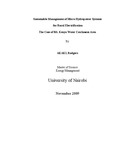| dc.description.abstract | The critical role that energy plays as an input to socio-economic development and environmental
protection is universally acknowledged. It is an important vehicle for income and employment
generation and for satisfying basic human needs. The provision of adequate, quality and affordable
energy services can play a decisive role in poverty reduction.
Some of the problems that have besieged rural electrification in Kenya include inadequate policies,
limited application of appropriate technologies, limited financing and weak institutional frameworks.
This study explored the challenges and opportunities associated with the sustainable management of
micro hydropower systems by evaluating some of the systems which are in existence in the Mt.
Kenya region. Data collection was based on field surveys and key informant interviews,
complimented by a review of the existing literature.
The research also assessed the sustainability and affordability of power provided to rural
communities through the government sponsored rural electrification programmes vis a vis
community based small scale power generation schemes such as micro hydropower systems.
Developing sustainable end uses from the produced power is an essential aspect of community-
based micro hydro power development. In the projects surveyed in the Mt. Kenya Region, the plant
factor is very low. This is because most consumers only use their lights for 6 hours. Successful
implementation of the day use distribution system will improve the plant factor significantly,
increase system income, and create revenue generating enterprises.
It is important for the government and other stake holders in the energy sector to gain a better
understanding of the strengths and weaknesses of the community-based management model of the
micro hydropower systems in order to help enhance the formulation of the required policies for their
sustainable development, management and replication.
The policies formulated should emphasize on clearly spelling out the development and management
of distributed non-convectional renewable energy such as micro hydros, which otherwise might be
marginalized, with preference given to building larger hydropower plants that are technoeconomically
cheaper per kW installed.
The regulatory framework, by institutions such as the Energy Regulatory Commission (ERC), is also
important to ensure that there are policies and regulations governing the development, management,
operation and maintenance of the micro hydros in order to guarantee safety and sustainability. | en |

